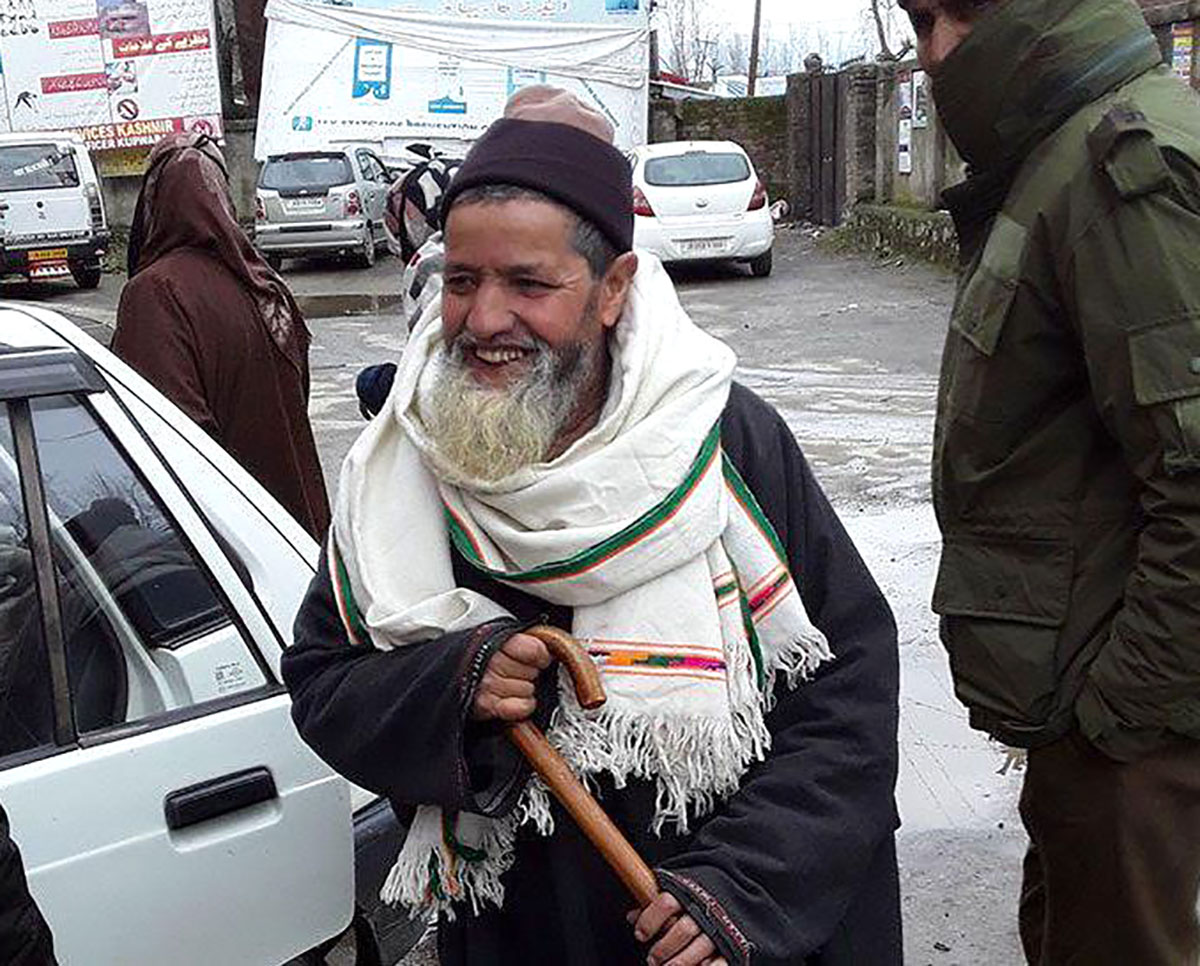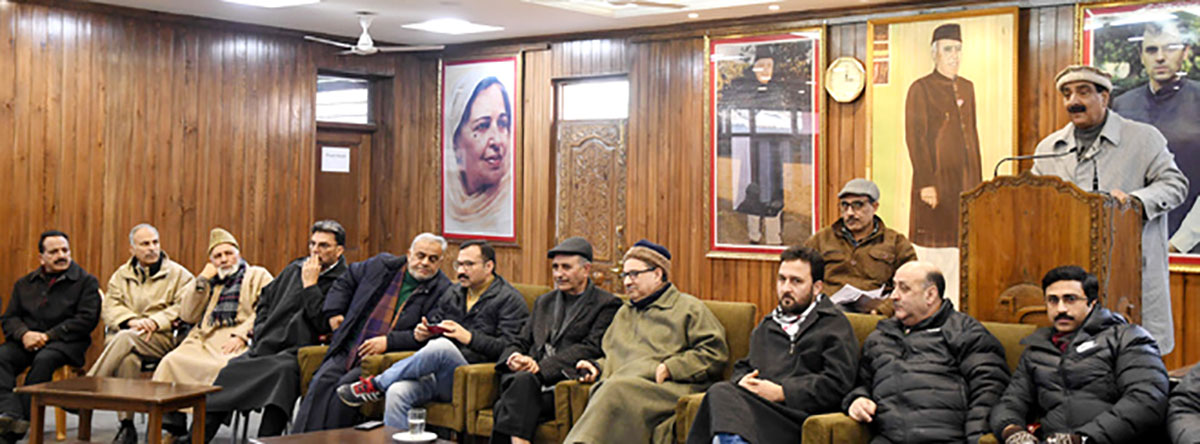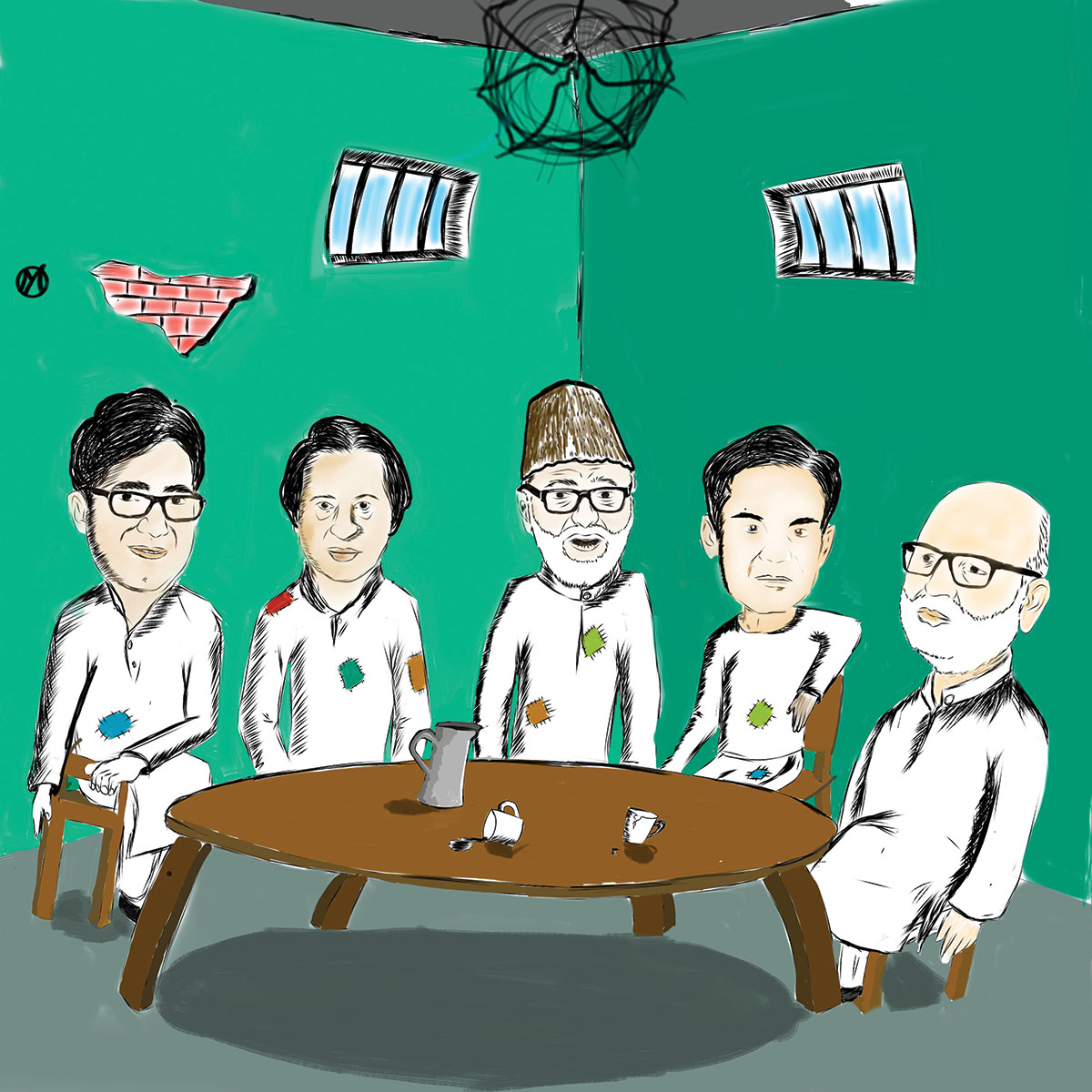History will remember 2019 as the rough year for politics in Kashmir. For the first time, both the faces of Kashmir’s ideologically driven politics were off the scene for different reasons. As the year approaches its conclusion, efforts are underway for a brand new platform, reports Saima Bhat

Ghulam Mohammad Bhat, 65, became Kashmir’s first prisoner to die in a faraway jail in Naini since August 5, when mass arrests preceded the scrapping of special status of Jammu and Kashmir. Ministry of Home Affairs (MHA) told the Parliament that around 5161 people were detained under ‘preventive measures’ and most of them were shifted to jails outside Jammu and Kashmir.
Bhat was arrested on July 17 for his affiliation with Jamaat-e-Islami (JeI), a socio-religious party that was banned by BJP government in February 2019; in run-up to the last Lok Sabha polls. Five months later, he died on December 20, in Uttar Pradesh’s Naini jail.
Back home, his family was happy to learn that Bhat’s PSA was quashed and he would be released in January. His son, Mohammad Haneef, a labourer told reporters that owing to their strained financial conditions they were unable to visit their father. It was only after the police gave him an air ticket that he was able to visit Naini. He went to see his father and was told he is no more.
“The jail officials said that my father expired on 11:20 pm on Friday [December 20]. They didn’t tell me how he had died. They just led me to the jail mortuary and asked me to identify my father’s body. The body was then taken for an autopsy,” Haneef was quoted saying. He then left from jail along with the corpse around 2.30 am on December 22 and straightaway reached his home Bonapara (Handwara) home, where Bhat was laid to rest the same night.
How Bhat died is a mystery to his family. They claim he lacked any ailments barring his limping leg, also an outcome of his earlier interrogation.
LETHPORA AFTERMATH
The crisis to Kashmir’s political class started quite early when the then governor Satya Pal Malik dissolved the assembly. It became visible in the aftermath of the horrific Lethpora car bomb explosion on February 14, 2019, that killed more than 40 CRPF personnel.
The first casualty became the Jamaat that was banned. Its cadres were arrested during 10-day long raids in anticipation of Balakote air strikes. After the ban order came, properties belonging to its members were also sealed. In quick follow up Yasin Malik was arrested and his JKLF was also banned on March 22. Currently in NIA custody, he is facing cases of Rubaiya Sayeed and killing of four Indian Air Force (IAF) personnel in Srinagar.
It was the time when the political parties were busy preparing for the Parliament and assembly elections, which they expected would be held together. National Conference (NC) and People Democratic Party (PDP) were reclaiming the grounds they had lost by staying away from Urban Local Bodies and Panchayat elections, leaving the space to independents, Congress and the BJP.
As they started using the ‘BJP scare’, Election Commission decided to defer assembly elections without disturbing the Lok Sabha polls. With thin margins, NC got all the three seats. BJP got two in Jammu and one in Ladakh.
After Narendra Modi led government took over, the new Home Minister Amit Shah flew to Srinagar on June 26. His interactions were restricted to bureaucracy and the security grid. He refused to meet any political party, one of whom had sent a written request. Analysts believed this was the beginning of a shift in Kashmir policy. During the meetings, Shah revealed his three-pronged strategy, “zero tolerance for terror, continuing strict action for terror funding, upholding the rule of law.” As soon as he landed in Delhi, additional battalions started flying to Kashmir. As it started creating panic NC’s Dr Farooq Abdullah, Omar Abdullah and Justice (retired) Hasnain Masoodi met Modi. Omar felt the meeting was “reassuring” in wake of the deployments being made during rumours of Article 35(A) abrogation.
A few days later on August 2, as the unease in air was growing within and outside Gupkar, Mehbooba Mufti attempted meeting Dr Farooq but failed. She later met Sajjad Lone and a delegation visited governor Malik. They planned an all-party meeting which took place and the Gupkar declaration was issued. In anticipation of another meeting, they all were put under house arrest during the intervening night of August 4. The same night all communication lines were blocked. A day later, everybody knew that Kashmir has lost its special status and now there are two UTs. In anticipation of the decision, mass arrests took place. A subsequent judicial intervention led to the identification of 144 minors, most of whom were detained and set free. Most of the detained were flown out of Kashmir.
Unlike all others, the political class that was on the right side of the ideological divide, comprising around 150 politicians were either restricted to their homes or lodged in Centaur Lake View Hotel on Boulevard after declaring it a sub-jail. Dr Farooq Abdullah, Omar Abdullah and Mehbooba Mufti were held separately. Abdullah Sr is at home; his son at Hari Niwas Palace and Mehbooba Mufti in a hut at Chashmashahi, and later shifted to a Bungalow on M A Road. After 42 days (September 15), Dr Farooq Abdullah, 81, five-time Chief Minister and five-time MP, was arrested under PSA.
For all these months, the families of the respective politicians are busy managing their requirements in detention. They are allowed to visit them, twice a week. Some of them are unwilling to talk.
“I have signed a bond,” Safia Abdullah told this reporter when asked about the condition of her father and brother. Dr Farooq’s detention was extended by three more months.

No family has south judicial help. Some say if they go to court and question their detention they too will be booked under the PSA. But Sehriyar Khanum, daughter of PDP’s Naeem Akhtar put it differently. “Why should we go begging before the administration when they have not done anything,” she said. “It has become ego issue for us as well.”
However, some politicians have signed personal bonds and went home. Vijaita Singh reported in The Hindu that five politicians including Mirwaiz Umer Farooq, two NC men and one each from PDP and Peoples’ Conference “signed the bonds” and “gave an undertaking that they would not indulge in any political activity after their release”.
After two months, when some of the political class in Jammu were allowed to move out freely, a delegation of 16 NC members met Dr Farooq and Omar, and on the same day two Parliamentarians Akbar Lone and Justice Masoodi also met the duo. But all these members were already informed about the do’s and don’ts of the meeting and restricted from talking to anybody about the meeting.
Ajay Sadhotra, a senior NC member, was part of the meeting. “BJP has suppressed the leadership in J&K but then there is Newton’s third law as well,” Sadotra said on phone. “I saw Farooq Sahib in high spirits. He told us we have to fight and we will. National Conference will always exist there.”
PDP members had also sought a permission to meet their president but the meeting was cancelled claiming “state administration wanted to portray normalcy.”
SIGNING THEIR FREEDOM?
Right now, around 33 detainees lodged in MLA hostel were reportedly approached by the administration and asked to sign a bond so that they can be released. The joint detention has helped these detainees from different political parties to come closer. Reports suggest that NC’s Ali Muhammad Sagar; PDP’s Naeem Akhar, PC chief Sajad Lone, and J&K PM chief Shah Faesal have repeatedly refused to sign the bond for their release.
“How can a politician give in writing that he will not indulge in any politics? Isn’t it suicidal warrant for a politician,” asks Shehriyar. As her father and others will complete five months on January 9, nobody has informed the families on what grounds they are detained. “Which makes it illegal detention.”
However, two leaders, Jammu and Kashmir People Democratic Front’s Hakeem Yaseen and Peoples Democratic Party’s (PDP) Mohammad Ashraf Mir, were released recently.
Since NC, PDP, and PC have most of their front line in detention, the parties are in disarray. An effort at realigning the political workforce is reportedly on.
BDC ELECTIONS
With main contenders in jail, the government decided to have polls for the BDC, a set up NC and PDP had deliberately not looked at. Congress party stayed away leaving independents and BJP members in the fray. Though most of the positions were taken by the independents, BJP got a good share – 1267 panch and sarpanch berths in Kashmir alone. In the subsequent election for BDC chairpersons, 81 were won by the BJP; one by the Congress; eight by Panthers Party and 217 by independents.
These elections were looking akin to the state assembly polls of sixties and seventies when the ruling party would dominate everything.
PARTY REVIVAL?
NC and PDP are now trying to regroup. Both the parties have had meetings recently at their respective party headquarters. Though NC’s Mustafa Kamaal was quoted in an interview that his party will not participate in any electoral process, pending reversal of centre’s decision on special status; his party was quick in releasing a statement saying they have not taken any such decision.
NC spokesman Imran Nabi Dar said he is regularly coming to his office. “Having meetings is not the revival of politics,” Dar said. “How can we do that when our senior members are in jail? We are demanding the release of all political leaders on priority.”
Dar believes the situation is abnormal. “There is no political process on ground, no semblance of system which is pro people, everybody is in fear and people are afraid to express,” he said. “It is not that we don’t want to resume our political activities but we have to review it first and that can happen only after our leaders are released unconditionally.” Dar also said no one is authorised to speak on party position or policy.
Everyone in the political class is cautious. Terming BJP “arrogant”, Sadotra said unless the political leadership is not freed, there can’t be any political space.
PDP’s Firdous Tak, who was put under house arrest for two months in Jammu calls 2019 as the “darkest phase” for Jammu and Kashmir’s politics. He fears that there is a vertical split between the two major communities in Jammu division.
“BJP and RSS played divisive politics and made it a religious fight rather than the normal, genuine special status issue,” Tak said from Jammu. “Due to creation of Islamophobia we see Muslims are not given any rented accommodation in Jammu’s posh areas.”
Tak says there is no question of reviving of political system. “We were only assessing the situation about if at all we can observe the anniversary of our party patron,” Tak said about the meeting, asserting parties are incapacitated to resume normalcy.
SMC STINKING?
Some politics is non-stop. The stink in the Srinagar Municipal Commission has grown unbearable. Fights and abuses are being hurled at each other by the members. There was a serious move to change the Mayor and his Deputy. A motion did throw away Sheikh Imran, the Deputy Mayor. But Junaid Matoo survived for the time being. Interestingly both belonged to Lone’s PC. How one survived and not another is something that might have links to the new politics.

Imran, who was in detention in the MLA hostel, has reportedly been arrested by the Vigilance Commission on December 26. Prior to his arrest, his father came with his resignation to the SMC. He had lost the vote before that.
It is important to note that BJP wanted to get a position. It has not given up, though.
A THIRD FRONT?
There has been a talk going on about creating “new politics”. After a selected group of politicians including PDP’s Muzaffar Beig, Syed Altaf Bukhari, and Usman Majeed of the Congress had a meeting with the European Parliamentarians, it indicated as if the party is ready for the take-off.
Baig later said in an interview that he is attempting to set the stage to strike a balance between Delhi and Kashmir. He suggested that J&K politicians must evolve a common strategy on the issues of contesting elections.
Though nothing actually came into being, the fresh political grapevine suggests that Bukhari, Beig, Ghulam Hassan Mir and many others may set up a new front. Mir, who heads his Democratic Party Nationalist, was under detention for almost four months. He believes the situation after August 5 induced fear for the jobs, land, economic blockade and loss of statehood as locals felt disgraced because Kashmir was once known as a nation.
Mir says fresh start is a must need. He admitted he is already in touch with many like-minded people, within and outside the MLA Hostel, across the party lines to create a platform.
“You can call it third front but I call it a joint platform,” Mir said. “I can’t give you names or figures presently. It will be premature to disclose it but yes we are in talking.” Mir said Bukhari that his close associate is also a part, and is presently in Delhi.















